
Strong to the Core: How Vitamins Can Build and Maintain Healthy Bones
Our bones serve as the silent architects of our body, providing structure, support, and protection. While we often associate bone health with calcium alone, the role of vitamins in this intricate process is equally important. Bones are not static; they undergo constant renewal and require nutrients to remain resilient throughout our lives. As we delve into the science behind how vitamins act as the building blocks for healthy bones, we offer insights into the nourishment necessary for a life of strength, vitality, and enduring skeletal well-being.
Because the body does not produce calcium on its own, it must be obtained through dietary sources. In this issue, we will tell you exactly what foods and vitamins can help keep your calcium levels up and support healthy bones.
What type of foods can add to my calcium intake?
A healthy, balanced diet will help you build healthy bones from an early age and maintain them throughout your life. A good diet is only one of the building blocks for healthy bones, the others include exercise and avoiding certain risk factors for osteoporosis.
Adults need 700mg of calcium a day, so to help you reach your goal, here are some our recommended sources to add to your diet:
- Milk, cheese and other dairy foods
- Green leafy vegetables, (such as broccoli, cabbage and okra, but not spinach*)
- Soya beans
- Tofu
- Plant-based drinks (such as soya drink) with added calcium
- Nuts
- Bread and anything made with fortified flour
- Fish where you eat the bones, such as sardines and pilchards
*Although spinach contains a lot of calcium, it also contains oxalate, which reduces calcium absorption. Therefore, it is not a good source of calcium.
The exploration into the relationship between vitamins and bone health reveals the vital role these micro nutrients play in supporting our skeletal structure.
What vitamins do I need to keep my bones healthy?
Maintaining healthy bones requires a combination of vitamins that work together to support bone formation, mineralisation, and overall skeletal well-being.
- Calcium: Bones are the main storage site of calcium in the body. However, your body can’t produce calcium itself. The body only gets the calcium it needs through the foods that you eat, or from vitamins. If you don’t get enough calcium in your diet, your bones will get weak or not grow properly.[1]
- Vitamin D: During the autumn and winter months, you should be taking vitamin D vitamins as the sun isn’t strong enough for the body to produce it itself. Vitamin D helps your body absorb the use of calcium, which gives your bones their strength and hardness. A shortage of vitamin D can lead to an increased risk of osteoporosis and broken bones. It can also lead to a risk of rickets in children and bone pain caused by a condition called osteomalacia in adults.[2]
- Vitamin C: Vitamin C is widely known as a powerful antioxidant as well as an effective cell protector and immunity booster, but also helps increase bone density. Vitamin C is important for healthy gums and healthy bones. Vitamin C is essential to the formation of collagen, the foundation that bone mineralisation is built on.[3]
- Magnesium: Magnesium is important in many processes in the body, including bone health. People with higher intakes of magnesium have a higher bone mineral density, which is important in reducing the risk of bone fractures and osteoporosis. Getting more magnesium from foods or vitamins will help older women improve their bone density.[i]
Achieving a balance of these vitamins through a varied and nutrient-rich diet is crucial for optimal bone health. Additionally, maintaining a healthy lifestyle with regular weight-bearing exercises contributes to overall bone strength and well-being. If you’d like to up your game when it comes to calcium and don’t feel your day-to-day diet is keeping pace, please do look our range of Sealions vitamins here: https://sealions.com/collections/vitamins-minerals
Beyond the emphasis on calcium, the significance of Vitamin D, Vitamin C, and Magnesium are crucial contributors to bone formation and maintenance. As our bones undergo constant renewal, it becomes evident that a good measure of nutrients is necessary to ensure enduring strength and vitality.
-
[1] [1] Falchetti, A. and Cosso, R., 2018. The interaction between vitamin C and bone health: A narrative review. Expert Review of Precision Medicine and Drug Development, 3(3), pp.215-223.
[2] Turner, A.G., Anderson, P.H. and Morris, H.A., 2012. Vitamin D and bone health. Scandinavian Journal of Clinical and Laboratory Investigation, 72(sup243), pp.65-72.
[3] Aghajanian, P., Hall, S., Wongworawat, M.D. and Mohan, S., 2015. The roles and mechanisms of actions of vitamin C in bone: new developments. Journal of Bone and Mineral Research, 30(11), pp.1945-1955.
[i]Uwitonze, A.M. and Razzaque, M.S., 2018. Role of magnesium in vitamin D activation and function. Journal of Osteopathic Medicine, 118(3), pp.181-189.
Tagged:









